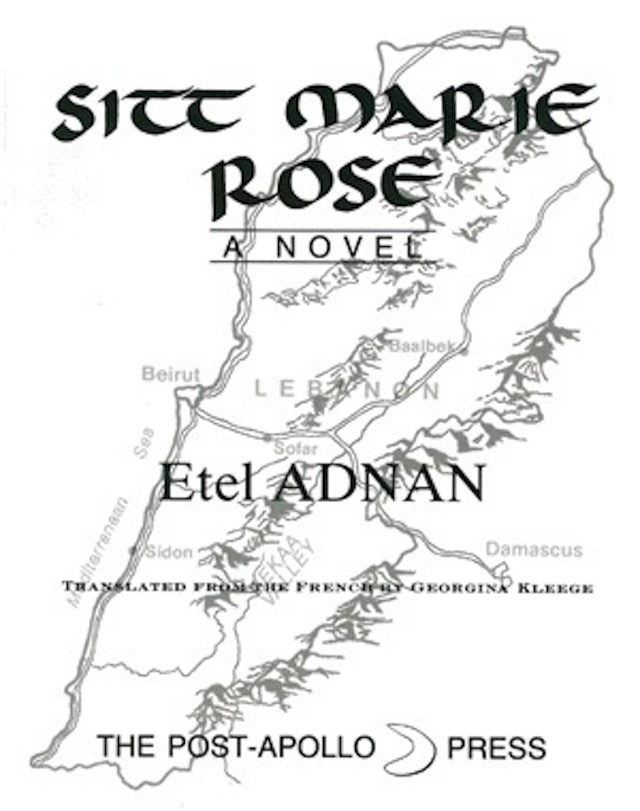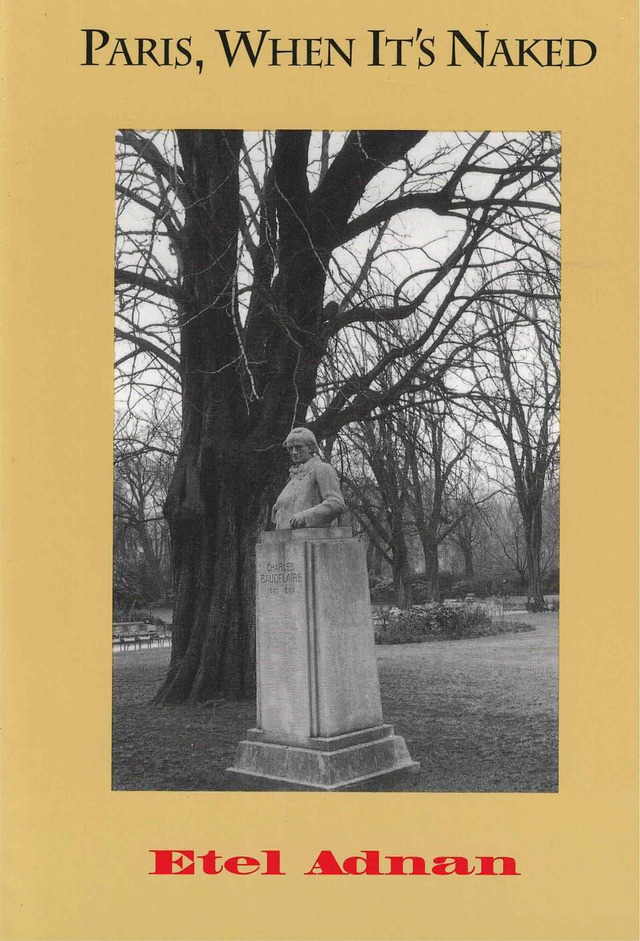Features reviews, discussion questions, and writing exercises for teaching Etel Adnan’s Sitt Marie Rose, Of Cities & Women (Letters to Fawwaz), and Paris, When It’s Naked.
Jump to: Book Descriptions · Lesson Planning · Reviews · Supplementary Materials · Contributor Bios
Sitt Marie Rose
This extraordinary novel on the Civil War in Lebanon won the France-Pays Arabes award in Paris and has been translated into six languages. Sitt Marie Rose is part of Comparative Literature, World Literature, Women’s Studies and Middle East Studies curricula at more than thirty universities and colleges in the U.S. The story is about a handful of characters and how their relationships are affected by the war… the real protagonist is the city itself. Since the story is narrated in a staccato style, the text takes on a quality reminiscent of Picasso’s Guernica.
— Celfan Review, Temple University
Paris, When It’s Naked
… Etel Adnan tells a story of our time, a time when simply to sit and think is to be baffled by a thousand shifting currents of social and political (and therefore personal) possibilities. Beneath the daily round of the individual, and the habituations of Paris as a locale, move forces (market, military, demographic) that threaten to subvert and destroy, promise to challenge and enlighten. This conflict is made naked here, thanks to Adnan’s wonderful ability to level with herself and her readers. The light of the personal becomes all the brighter, among such giant shadows.
— David Bromige
Of Cities & Women (Letters to Fawwaz)
Written against the background of war at the turn of the century, this millennium — the Gulf War, the Lebanese Civil War and the military occupations of that country, the author’s country of origin — these letters, Of Cities and Women, are in their turn now letters to cities and women — that we, that is, women and men alike, might eventually, before it is too late, ‘find the right geography for our revelations.’
— Barbara Harlow, University of Texas at Austin
Discussion Questions
- In these writings, Adnan examines the way power looks at its subjects. All three books seek to understand the character of the colonial gaze, the male gaze, and the narrative gaze. Often, the texts themselves will assume these different positions, playing with them in order to better comprehend them. Find examples from the three books of 1) lines or sections that discuss different formations of the gaze, and 2) lines or sections that utilize different formations of the gaze.
- In Of Cities and Women, the narrator states, “I know that seeking political and philosophical notions in the street is like trying to construct a barrier to hold back the ocean, but I won’t look elsewhere.” What does she mean by this? Is it a sentiment that applies to the other two books? Why is Adnan firm in her conviction to not “look elsewhere”?
- Adnan meditates on the possibility of universalization: the dissolution of tribal categories toward the formation of larger human communities. Explore how this notion plays out in all three books. Do Adnan’s writings imply a desire for universalization? Or is it a conflicted vision?
- Consider the boat and sea metaphors that populate these texts. Why do you think Adnan chose them?
- In Paris, When It’s Naked, Adnan writes, “Information and propaganda have become so entangled that those who specialize in them acquire severe reality problems” (60). Does this idea appear in the other two books as well? What does she mean by “reality problems”? How is this perspective relevant today?
- In her review of Sitt Marie Rose, Jane Creighton writes: “It has become clear that maps of the Middle East and their accompanying texts have failed to account for the religious, economic, and political divisions that rage within these borders, defined in history by people who did not live there.” Writing is a form of mapping. How do Adnan’s experimental prose methods—e.g. non-linearity, repetition, and shifting narrative perspective—shake up or re-map the world? How do they re-structure power relationships?
Writing Exercises
- On a large piece of paper, draw a rough outline of a country you are familiar with. Then re-define this geography by improvising names, descriptions, and bits of text that articulate your subjective relationship to regions of the map, writing them down as you think of them in the places to which they correspond. Draw from wherever you like: personal memory, cultural experience, sonic associations, found text, etc.
- Create your own version of Paris, When It’s Naked, focusing on a city you know well (e.g. New York, When It’s Naked or Tokyo, When It’s Naked, etc.).
- Take an essay that you’ve written for a class and rewrite it as a series of personal letters to a friend.
Etel Adnan’s Paris, When It’s Naked: The Poet’s Novel, by Laynie Browne @ Jacket2
Ammiel Alcalay reviews Paris, When It’s Naked and Of Cities and Women (Letters to Fawwaz), originally published @ The Nation
Lee O’Brien reviews Sitt Marie Rose @ Middle East Research and Information Project
Jane Creighton reviews Sitt Marie Rose @ New Women’s Times
Related Content
- “The Secret of Being a Woman,” an essay on Etel Adnan’s quest by Mona Takieddine Amyuni @ Al Jadid
- “Transgressive Subjects: Gender, War, and Colonialism in Etel Adnan’s Sitt Marie Rose,” by Sami Ofeish and Sabah Ghandour, in Etel Adnan: Critical Essays on the Arab-American Writer and Artist
- “Contemplating Apocalypse: On the Work of Etel Adnan,” by Lindsay Turner @ Kenyon Review
- Etel Adnan in conversation with Lisa Robertson @ BOMB
- “Etel Adnan: Children of the sun,” Lynne Tillman @ Bidoun
Relevant News
- “The uneasy beautification of Beirut” @ Financial Times
- “Beirut clamping down on Syrian refugee campaigns in Lebanon” @ The New Arab
- “Beirut Is Blocking Its World Famous Beaches From The People Who Actually Live There” @ GOOD
- “Water pollution in Lebanon reaching dangerous levels” @ Al-Monitor
- “Protesters in Paris rally against Israeli PM’s visit” @ Al Jazeera
- “The dark side of tourism: Barcelona residents either put up or move out” @ EuroNews
- “Barcelona airport strikes cause severe delays” @ The Guardian
- “French activist farmer convicted for helping migrants” @ Arab News
- “Skopelos gets heaviest snowfall in 30 years” @ Ekathimerini
- “Why London’s tech and media workers are being wooed into relocating to Amsterdam” @ Evening Standard
- “The Netherlands: Amsterdam on collision course over social assistance experiments” @ Basic Income Earth Network
- “Tech scene targets Berlin and Google moves in” @ South China Morning Post
- “Berlin 24/7: How welcome are LGBTI refugees in Berlin?” @ Deutsche Welle
- “Romans are about to go eight hours a day without water” @ Washington Post
- “Rome bans drinking on public streets in the evening” @ Food & Wine
Etel Adnan
Etel Adnan was born in Beirut, Lebanon in 1925. Her work as a whole is a faithful record of the times and places she has lived in Beirut, Paris, and in the San Francisco Bay Area. At least eighteen works by Adnan have been published in English. They include Sitt Marie Rose (Post-Apollo Press, 1982); The Arab Apocalypse (Post-Apollo Press, 1989); Sea and Fog (Nightboat Books, 2012), winner of the Lambda Literary Award for Lesbian Poetry and the California Book Award for Poetry; Premonition (Kelsey Street Press, 2014); Surge (Nightboat Books, 2018); and Time (Nightboat Books, 2019), winner of the Griffin Poetry Prize and the Best Translated Book Award. Nightboat Books published the 2-volume set, To look at the sea is to become what one is: An Etel Adnan Reader, in 2014. Also in that year, Adnan was named a Chevalier des Arts et des Lettres, France’s highest cultural honor, by the French Government. Her paintings, described by New York Times art critic Roberta Smith as “stubbornly radiant abstractions,” have been widely exhibited. Spanning media and genres, Adnan’s writings have led to numerous collaborations with artists and musicians, including the French part of CIVIL WarS, a multi-language opera by American stage director Robert Wilson, performed in Lyon and Bobigny in 1985.



